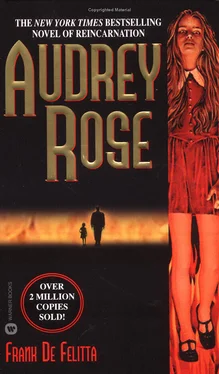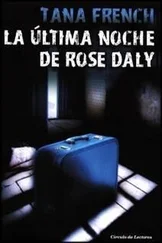The door pushed inward. Dr. Schanzer’s secretary held it open for Janice.
“Your wife is here, Mr. Templeton,” the secretary said cheerfully, and quickly left.
“Come join the fun,” he said, pulling out the chair next to his. Janice looked very pretty, he thought: cool, fresh, and wearing an outfit he didn’t remember seeing before. She had obviously taken pains to please him, which was a good omen.
“Better take off your jacket,” he warned. “This place is a steam bath.”
“I’m okay,” she said, sitting down beside him.
“How’s Ivy?”
“Much better. Her temperature is down to one hundred. Dr. Kaplan stopped by and changed her bandages. He doesn’t think the burns will leave a scar.”
“Thank God,” Bill said strongly, then asked, “Carole with her?”
Janice nodded. “They were watching Let’s Make a Deal when I left.”
“Anyone call this morning?”
“No,” Janice said, knowing to whom he referred.
Bill sat down and tossed her the folder. “Dig in,” he said.
“Anything interesting?” Janice opened the folder and started reading the first scrap of yellow paper.
“A lot we already know; a lot I don’t understand.”
Bill rose, put on his jacket, and excused himself to get a drink of water. Walking down the long corridor, looking for a water fountain, he almost collided with a young, swarthy man emerging from a brightly lit office on the right and wondered if this might be Dr. Perez. He found a men’s room hidden inside a small alcove and went in. The water felt cold and bracing against his face as he bent his head down into his cupped hands and even drank some of it. He gave Janice enough time to finish reading before returning to the conference room.
Dr. Schanzer was with Janice when he arrived, the folder clutched in his hand possessively. Janice looked decidedly paler than when he had left her.
“Forgive me for keeping you waiting, Mr. Templeton.” Dr. Schanzer’s dark-brown eyes twinkled at him. He was a stocky white-haired man with powerful arms and chest. “I was telling Mrs. Templeton here that Dr. Noonis, one of our associates, might find a slot for your daughter later this week. He has five thirty on Friday afternoon open; if that’s convenient, we could set up an appointment for a family interview.”
“I don’t know,” Bill hedged. “We were planning a trip.…”
“My daughter and I will be here, Doctor,” Janice interposed. “Friday will be fine.” The statement was uttered in the same dull monotone he had heard that morning: impassive, indifferent, apathetic.
“Fine,” Dr. Schanzer intoned. “Then I’ll make the appointment for you.” He rose to leave.
“Doctor—” Bill’s voice stopped him. “Can you tell me what archetypes are?”
Bill noticed Janice’s quick, grave look through the corner of his eyes. The doctor shut the door and formed a small smile on his face. He seemed almost amused by the question.
“Jungian archetypes. The word is a contrivance of Dr. Jung’s. It refers to what he called the collective unconscious. In his work with schizophrenics, he was struck by the frequent appearance of images which were remarkably similar in patients of widely varied backgrounds. The evidence suggested to him that the mind of man as well as his body bears traces of his racial past, that his longings, expectations, and terrors are rooted in the prehistory over and above his experiences as an individual.”
“Do people in your profession subscribe to this theory?”
Dr. Schanzer chuckled. “Let me say, Mr. Templeton, that people in my profession attempt to keep an open mind at all times. Dr. Jung was a brilliant man, but something of a maverick—a lot of his theories are pretty explosive, yet there is merit in a great many of them.”
“Do you believe that people can remember things that they didn’t personally live through?”
The smile on Dr. Schanzer’s face lessened somewhat.
“I, for one, do not believe in a racial unconscious, Mr. Templeton, or in memories inherited from the collective prehistory of an individual’s background.”
“Thank you,” Bill said.
“Ten days without the two of you—it’s gonna be pure hell, you know that.”
They were back in Rattazzi’s, sitting, Janice thought, at the very same table. It was a few minutes before one o’clock, and the room was filled with people and noise. Everyone seemed to be shouting, Bill included.
“I mean,” he continued, a touch too sorrowfully, “you don’t even leave the hope that you might join me in a day or so.”
His face was flushed; his eyes were beginning to glaze. The straight gin was having a decided effect on him. Janice had resolved to stay sober. Since she would be alone now with Ivy and an uncertain future lay before them, a clear head was essential.
“I don’t believe there is a hope that we can,” Janice answered quietly. “Considering what’s been happening to us lately, do you?”
“I think you’re taking this whole business too seriously.”
Janice looked at him, unbelieving.
“What amazes me is that you don’t.”
“Okay, I left myself wide open for that one. Let me rephrase. The health and happiness of my family are of prime concern to me. Your depression, Ivy’s problem, I take very seriously. I am trying to do something about them.” His sentences were spaced out and slightly tipsy. “To you, I can only offer love, understanding, and extreme patience. To Ivy, I offer the additional benefit of expert medical help, which she will receive. The business I do not take seriously is all the business with Hoover and archetypes, and all the crazy mumbo jumbo that’s been going on in our lives, lately.…”
“For God’s sake, Bill—” Janice exploded. “You honestly think that what’s been happening to Ivy is nothing more than a simple illness like … like the flu? And what you read in Dr. Vassar’s book—you don’t see a connection to Hoover—you consider her opinions and conclusions all a pack of mumbo jumbo?”
The waiter brought Bill’s martini.
“Do it again,” he mumbled and, picking up the fresh drink, quaffed half of it in one gulp. He focused bleary eyes across at Janice and continued in a low, husky voice.
“I don’t think that a D-r in front of a person’s name necessarily makes them infallible. You know, there are a lot of dumb doctors in the world—”
“Oh, wow! You really believe that?”
“Yeah. And since you bring it up, let me tell you a little more about what I really believe. I’m a firm believer in things as they are. Not what they seem to be, but what they are. Dig? I may not like some of those things, but I know damn well I can’t change them, and I sure as hell ain’t gonna try.…” He raised the glass and finished the drink down to the olive. “I believe that up is up and down is down. I believe that if I stood on this table and dived off headfirst, I’d probably break my neck. There’d be no guardian angel around to cushion my fall. I’d be taken either to a hospital or to the morgue. If I died, I would either be cremated or planted in the ground, and it would be the end of me. No harps, no wings, no pitchforks, no nothin’. Finis!” He paused to allow the message to sink in. “I do not believe that I would ever find myself floating around some maternity ward, waiting to sneak into the body of some unsuspecting infant as he came popping out. I’m sure he would resent it, and I know I would be horrified.…”
Janice suddenly found herself laughing, in spite of herself.
“No, don’t laugh!” he cautioned, raising his voice. “I’m not kidding, and I’m not finished!”
The laughter departed Janice’s face as she saw the look of intense sincerity in his red-rimmed eyes.
Читать дальше












